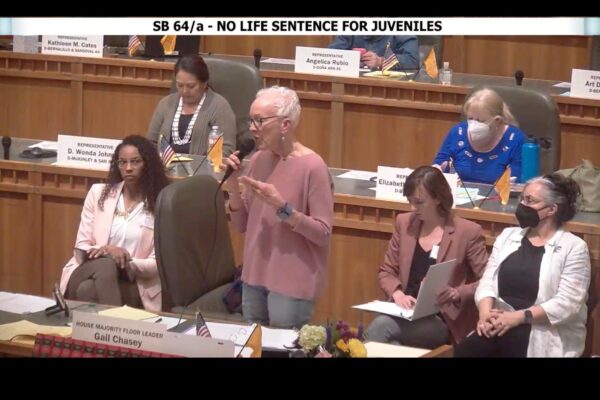In March 2023, New Mexico became the 27th state to ban sentencing children to life in prison without parole through the passage of the No Life Sentences for Juveniles Act. Denali Wilson, a staff attorney and expert on juvenile justice for the ACLU of New Mexico, shared that this was a significant step forward in repairing the juvenile justice system and, for the first time, gave substantial hope of a new beginning to people who have been incarcerated for serious offenses they committed while they were children.
However, six months later, Gov. Lujan Grisham signed an executive order that suspended the Juvenile Detention Alternative Initiative (JDAI), a program intended to help kids avoid juvenile prison by determining whether they are at risk to themselves or others, and if they were not, allowed them to await their trial at home.
"It’s like showing up to a house fire with a hose filled with gasoline and wondering why the problem isn’t going away."
Wilson explained that programs like JDAI arose from scientific evidence showing that incarcerating kids was not helping community safety. Juvenile justice experts warned that the governor’s decision to suspend JDAI could lead to overzealous policing, senseless incarceration, and exposure to adult punishment and cruel conditions rampant in New Mexican juvenile facilities. So far, it has done exactly that; nearly a third of the 87 young people detained between September and November 2023 would have waited for their trials at home if JDAI had been in place.
“As the advocate and author Danielle Sered puts it, it’s like showing up to a house fire with a hose filled with gasoline and wondering why the problem isn’t going away,” said Wilson.
Suspending the JDAI guidelines and incarcerating more kids is counterproductive to public safety. Not only does incarcerating children not solve the problems that lead them to commit crimes in the first place (70–80% of incarcerated kids go back into the prison system as adults), but it also increases the likelihood that they will experience mental health disorders, suicidal ideation, and live less healthy lives than their peers overall. Despite all the evidence to the contrary, Source NM reports that the governor wrongly believes detention is the best solution to help young people, particularly those dealing with addiction.
The idea that we should respond with harsher punishments for juveniles has been gaining traction. This month, Bernalillo County Sheriff John Allen called for a need to use restraint and force on children in juvenile detention settings. This was in response to growing unrest and resistance to inhumane conditions in Bernalillo County Juvenile Detention.
“Laying these problems at the feet of children is wrong,” said Wilson. “We should be focused on giving children every chance to succeed and redeem themselves, not creating more opportunities to incarcerate them."
Wilson hopes that with the passage of The No Life Sentences for Juveniles Act, we will take this unique moment of reckoning to learn how to move forward.
“The No Life Sentences for Juveniles Act gives us an opportunity to look at the people who were sentenced to life in prison for serious acts of violence that they took part in as children 20–30 years ago and decide whether that response of punishment and isolation made us safer, made families whole, or deterred future violence,” said Wilson.
"We should be focused on giving children every chance to succeed and redeem themselves, not creating more opportunities to incarcerate them."
On January 30, 2024, advocates who have been previously incarcerated or have incarcerated loved ones will gather at the Roundhouse to tell lawmakers that New Mexicans want treatment over punishment, resources, not prisons, and alternatives to incarceration that keep families whole. We are demanding lawmakers shift away from a fear-based approach in public safety to a proactive, solutions-based vision that inspires hope in New Mexico.
We must view children’s behavior and (perceived) misbehavior objectively; we must be honest about where these problems stem from, begin to question the institutions that exist that perpetuate them, and be willing to reimagine what community safety looks like.
“Kids are struggling to meet their needs, find love and belonging, and are looking for it in the wrong places. There is no fast and easy way to fix this,” said Wilson. “It will take bravery in the same way it takes analysis. We need real solutions, not snappy sound bites. The current approach is leaving our community hurting."

